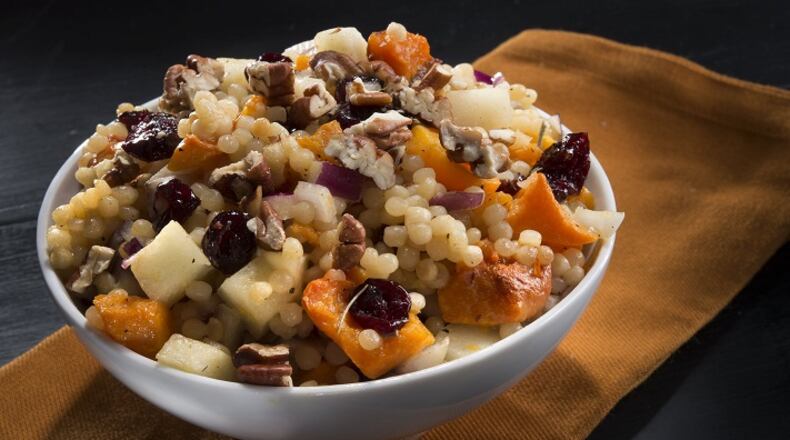While pantry ingredients like pomegranate molasses and zaa’tar may not make it into a regular meal rotation, Israeli couscous is an easy ingredient to work into a menu plan. It’s widely available in the health food or ethnic aisles of larger supermarkets. Similar to rice, the key to this larger format couscous is to steam it until it’s tender but not gummy.
Solomonov was born in Tel Aviv and grew up in Pennsylvania so his dishes combine Israeli cooking techniques with seasonal American ingredients. The Kansas City Star’s Israeli Couscous With Roasted Butternut Squash pairs the semolina-wheat pasta with the flavors of fall: toasted pecans, pears and cranberries.
Preparation tips: Toasting the walnuts intensifies their flavor. To toast, spread the walnuts or pecans on a baking sheet. Bake at 350 degrees for 5 to 7 minutes or until lightly toasted.
Butternut squash cubes are often readily available, already peeled and cut in the produce section of large grocery stores. Alternately, you can cut the butternut squash. To make cutting easier, pierce the squash 3 or 4 times with a sharp knife. Microwave the squash on high (100 percent) power for 1 to 2 minutes; allow to stand and cool 3 minutes. Using a large, heavy knife, cut off stem. Peel using a vegetable peeler. Cut the squash in half and scoop out the seeds. Cut the flesh into cubes.
———
ISRAELI COUSCOUS WITH ROASTED BUTTERNUT SQUASH
Makes 4 servings (total yield 5 cups)
1/2 cup Israeli couscous
Nonstick cooking spray
2 cups butternut squash cubes (see tips)
3 tablespoons olive oil, divided
Salt and pepper to taste
1/4 cup orange juice
2 tablespoons honey
1 tablespoon whole-grain mustard
1/2 teaspoon dried rosemary, crushed
1/2 small red onion, chopped
1/4 cup dried, sweetened cranberries
1 pear, peeled and cored
1/4 cup coarsely chopped walnuts or pecan halves, toasted
Fresh spinach leaves or other dark green lettuce leaves
Cook couscous, according to package directions, omitting oil. Set aside.
Preheat oven to 400 degrees. Line a baking sheet with aluminum foil and spray with nonstick cooking spray. Toss squash cubes with 1 tablespoon olive oil and season with salt and pepper. Spread squash in a single layer on prepared pan. Bake, uncovered, 15 to 20 minutes or until roasted and just fork tender.
In a small bowl, whisk together orange juice, honey, mustard and rosemary. Whisk in remaining 2 tablespoons olive oil. Season lightly with salt and pepper; set aside.
In a mixing bowl, combine couscous, squash, onion and cranberries.
Chop half of the pear and add it to couscous mixture. Reserve remaining pear for garnish.
Toss couscous mixture with orange juice mixture.
Line 4 individual plates with fresh spinach or lettuce. Spoon couscous mixture on each. Sprinkle with walnuts. Thinly slice remaining half of pear and use as a garnish.
Per serving: 327 calories (40 percent from fat), 15 g total fat (2 g saturated), no cholesterol, 45 g carbohydrates, 6 g protein, 53 mg sodium, 4 g dietary fiber.
Recipe developed exclusively for The Star by professional home economists Kathy Moore and Roxanne Wyss.
About the Author

